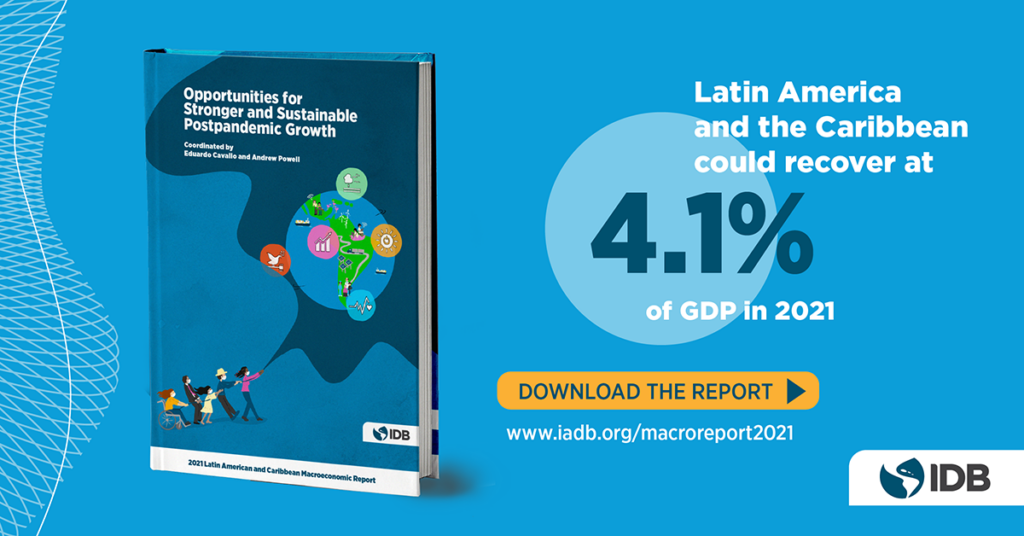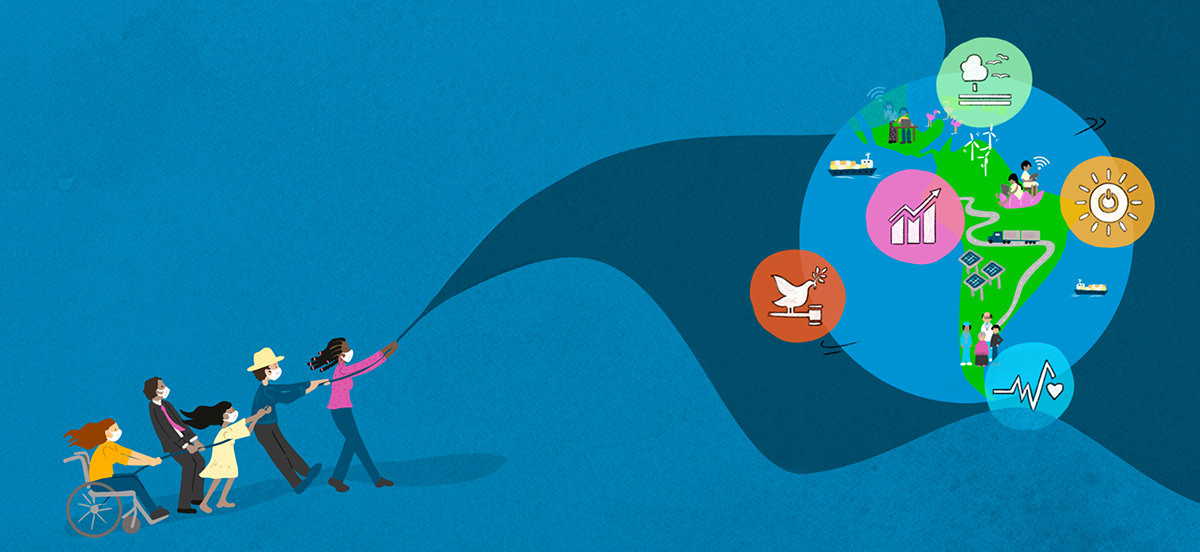
It has been a traumatic year. As the COVID-19 pandemic spread around the world, hundreds of thousands of people in Latin America and the Caribbean died and the economy spun into crisis. About 7.4% of GDP was lost—the single largest recorded fall in output in a single year. Lockdowns and restrictions on human movement led to negative shocks to both supply and demand, and trade and economic activity shrank. Governments provided economic relief, and tax revenues plummeted; fiscal deficits surged.
The economic toll has been immense. An estimated 10% of jobs were lost between February and October 2020 (falling to 7% by February 2021), and extreme poverty is projected to rise from 12% to almost 15%. While the region was already losing ground in terms of its share of global GDP before the pandemic hit, the crisis has only reinforced that trend, threatening to leave countries poorer, more unequal, and with higher debts.
Governments supported families and firms with transfers to households, lower taxes, and financial programs aimed particularly at supporting small and medium-sized enterprises. The average fiscal package was about 8.5% of GDP, and though smaller than the 19% in advanced economies, helped provide a safety net. Overall fiscal deficits rose from 3% of GDP in 2019 to 8.3% of GDP in 2020, as public debt rose from 58% of GDP in 2019 to 72% of GDP in 2020.
Economic activity has started to bounce back, but how fast and sustainable the recovery will be depends critically on winning the war against the virus. Current projections put the region on track to grow 4.1% in 2021 with a return to trend growth of about 2.5% per year after that. But as detailed in the 2021 Latin American and Caribbean Macroeconomic Report, if vaccine rollouts are delayed or more contagious strains prove to be vaccine resistant, new lockdowns could result in positive growth in 2021 that would turn negative in 2022, before recovery really took hold—a double-dip or “W-shaped” recovery.
There are also upside risks. China grew in 2020, helping to support commodity prices, and is expected to beat its official target of 6% growth in 2021. Growth projections have been boosted in the United States given the additional US$1.9 trillion dollars in approved economic relief. Still, longer term interest rates have already risen and if growth prompts the labor market to tighten and push up price expectations, the Federal Reserve may be forced to alter its patient stance on policy interest rates. Even the hint that policy rates may start to climb could provoke a financial market correction. If that turns out to be mild, simulations suggest growth in Latin America and the Caribbean could be as high as 5.2% in 2021. But a sharper correction could wipe out the gains of a faster global recovery, bringing growth rates for the region back to the baseline.
Few times in modern Latin American and Caribbean history have been as challenging for policymaking. Governments are navigating the narrow path of providing relief to families and firms while maintaining fiscal sustainability. Central banks expanded their balance sheets and will need to pare back their interventions as demand recovers. They will also have to manage roll-overs of short-term liabilities. Bank balance sheets may be hiding substantial risks as deferred loans continue to mature. Public guarantee programs may create additional fiscal burdens. Argentina, Barbados and Ecuador have already restructured debts. Other countries may face tough decisions in the months ahead.
Finding the right fiscal strategy will be key. Each country will have its own recipe. In general, in South America, there is a large tax take and spending levels are high. So seeking greater efficiency there could bring very significant rewards. In Central America, countries with low takes have ample room to increase taxes. Assuming a high level of efficiency, they could also boost well-targeted spending.
Just increasing efficiency could yield up to 4.4% of GDP per year on average, and more in some cases. Enhancing the tax base and reducing informality, avoidance, and evasion could bring additional substantial rewards, and allow for lower tax rates or higher beneficial spending on education or on health.

The timing of fiscal consolidation after the crisis will have to be managed very carefully. If it is too fast, recovery may stall. If it is too slow, debt sustainability may be put at risk. Improving fiscal institutions would provide immediate benefits. Greater credibility would allow for a more gradual adjustment with lower interest rates that would reduce the potential risks of consolidation.
With crises also come opportunities. Multinational companies have been rethinking their supply chains. The United States switched over US$50 billion of imports to new suppliers. This represents a huge opportunity as the region only exports about US$26 billion to its northern neighbor. Still, many firms find it difficult to participate on a consistent basis in global value chains. Improving the work of export agencies, as well as logistics, trade infrastructure and trade finance, could all help.
Boosting regional value chains could allow firms in the region to become more competitive internationally. But the spaghetti-bowl of regional trade agreements has many inconsistencies that prevent regional supply chains from developing. A bottom-up approach to ensure consistency could lead to increases in regional trade and to more globally competitive firms.
The crisis particularly hurt labor-intensive sectors where social distancing was hard. Evidence from previous crises shows that these sectors are likely to bounce back as the health crisis fades. These sectors, however, have the lowest levels of productivity. So the crisis provides an opportunity to rebuild them into more productive versions of themselves. With the right policies to promote formality and allow successful firms to grow, these sectors could be transformed to boost productivity in general.
There is also an urgent need to boost infrastructure investment. This could be financed either through the public sector, by taking advantage of fiscal savings, or through financing from private sources. Well-chosen projects benefit low-income families, promoting inclusive growth. Infrastructure also has spillovers to other sectors. And the right projects can boost productivity in sectors as they recover.
Each peso of investment in infrastructure adds about two pesos to GDP. But efficiency in infrastructure investment leaves a lot to be desired. If this could be improved, multipliers could be even higher.
Finally, the region is still facing another challenge that has not disappeared—namely the climate crisis. Here there is some good news. Technology has advanced to the extent that there is now no real trade-off between climate goals and growth objectives. Adopting ambitious climate goals can be growth-enhancing. By expanding renewable electricity capacity and electricity grids, increasing electrical mobility, boosting mass transit, and improving energy efficiency in the residential, commercial, and industrial sectors, countries of the region can create millions of jobs and add about 1.3 percentage points of incremental growth per year.
Our report provides further details about the risks and recommendations on how the region can move past the upheavals of the pandemic. It suggests policies to reduce vulnerabilities and to build a foundation for higher growth, with more inclusive and sustainable economies. There is no time like a crisis to shake up old ways and start anew on a more promising path—and that time is now.


Leave a Reply